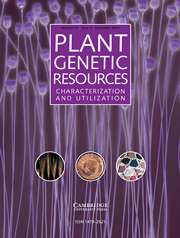Crossref Citations
This article has been cited by the following publications. This list is generated based on data provided by
Crossref.
Lee, Gi-An
Jeon, Young-Ah
Lee, Ho-Sun
Hyun, Do Yoon
Lee, Jung-Ro
Lee, Myung-Chul
Lee, Sok-Young
Ma, Kyung-Ho
and
Koh, Hee-Jong
2017.
New Genetic Loci Associated with Preharvest Sprouting and Its Evaluation Based on the Model Equation in Rice.
Frontiers in Plant Science,
Vol. 8,
Issue. ,
Gu, Xing-You
Pipatpongpinyo, Wirat
Zhang, Lihua
Zhou, Yuliang
Ye, Heng
and
Feng, Jiuhuan
2018.
Two Contrasting Patterns and Underlying Genes for Coadaptation of Seed Dormancy and Flowering Time in Rice.
Scientific Reports,
Vol. 8,
Issue. 1,
Matsuura, Takakazu
Mori, Izumi C.
Himi, Eiko
and
Hirayama, Takashi
2019.
Plant hormone profiling in developing seeds of common wheat (<i>Triticum aestivum</i> L.).
Breeding Science,
Vol. 69,
Issue. 4,
p.
601.
Kim, Woo-Jae
Shin, Woon-Cheol
Kim, Jeong-Ju
Park, Hyeon-Su
Nam, Jeong-Kwon
Baek, Man-Kee
Cho, Young-Chan
and
Kim, Bo-Kyeong
2019.
‘Seongsan’, an Early Maturing Multi-Resistant Rice with Good Grain Quality and High Yield.
Korean Journal of Breeding Science,
Vol. 51,
Issue. 4,
p.
462.
Galimudi, Anusha
KB, Eswari
Gandhudi, Lakshmidevi
LRK, Jai Vidhya
S, Narender Reddy
Addanki, Krishnam Raju
Balakrishnan, Divya
Desiraju, Subrahmanyam
Jukanti, Aravind Kumar
LV, Subba Rao
and
Badri, Jyothi
2020.
Genetic analysis of dormancy and shattering traits in the backcross inbred lines derived from Oryza sativa cv. Swarna / O. nivara Ac. CR100008.
Oryza-An International Journal on Rice,
Vol. 57,
Issue. 1,
p.
1.
Cheon, Kyeong-Seong
Won, Yong Jae
Jeong, Young-Min
Lee, Youn-Young
Kang, Do-Yu
Oh, Jun
Oh, Hyoja
Kim, Song Lim
Kim, Nyunhee
Lee, Eungyeong
Yoon, In Sun
Choi, Inchan
Baek, Jeongho
Kim, Kyung-Hwan
Park, Hyun-Su
and
Ji, Hyeonso
2020.
QTL mapping for pre-harvest sprouting resistance in japonica rice varieties utilizing genome re-sequencing.
Molecular Genetics and Genomics,
Vol. 295,
Issue. 5,
p.
1129.
Pipatpongpinyo, Wirat
Korkmaz, Ugur
Wu, Hao
Kena, Alexander
Ye, Heng
Feng, Jiuhuan
and
Gu, Xing-You
2020.
Assembling seed dormancy genes into a system identified their effects on seedbank longevity in weedy rice.
Heredity,
Vol. 124,
Issue. 1,
p.
135.
Wang, Junwei
Korkmaz, Ugur
Guo, Min
Pipatpongpinyo, Wirat
and
Gu, Xing-You
2020.
Pyramiding seed dormancy genes to improve resistance of semi-dwarf varieties to pre-harvest sprouting in rice.
Molecular Breeding,
Vol. 40,
Issue. 10,
Sano, Naoto
and
Marion-Poll, Annie
2021.
ABA Metabolism and Homeostasis in Seed Dormancy and Germination.
International Journal of Molecular Sciences,
Vol. 22,
Issue. 10,
p.
5069.
Sohn, Soo-In
Pandian, Subramani
Kumar, Thamilarasan Senthil
Zoclanclounon, Yedomon Ange Bovys
Muthuramalingam, Pandiyan
Shilpha, Jayabalan
Satish, Lakkakula
and
Ramesh, Manikandan
2021.
Seed Dormancy and Pre-Harvest Sprouting in Rice—An Updated Overview.
International Journal of Molecular Sciences,
Vol. 22,
Issue. 21,
p.
11804.
Lee, HyeonSeok
Choi, MyoungGoo
Hwang, WoonHa
Jeong, JaeHyeok
Yang, SeoYeong
and
Lee, ChungGen
2021.
Occurrence of rice preharvest sprouting varies greatly depending on past weather conditions during grain filling.
Field Crops Research,
Vol. 264,
Issue. ,
p.
108087.
Min, Myeong-Hyeon
Khaing, Aye Aye
Chu, Sang-Ho
Nawade, Bhagwat
and
Park, Yong-Jin
2024.
Exploring the genetic basis of pre-harvest sprouting in rice through a genome-wide association study-based haplotype analysis.
Journal of Integrative Agriculture,
Vol. 23,
Issue. 8,
p.
2525.
Yi, Xin
Hua, Wanyi
Zhang, Ziqiang
Liu, Lei
Liu, Xi
Liu, Fuxia
Tang, Tang
Yang, Hengxuan
Zhang, Jingtian
Wu, Depeng
and
Zhao, Xiangxiang
2025.
Dissecting the Genetic Basis of Preharvest Sprouting in Rice Using a Genome-Wide Association Study.
Journal of Agricultural and Food Chemistry,
Vol. 73,
Issue. 5,
p.
3257.


